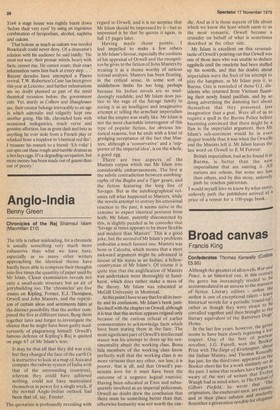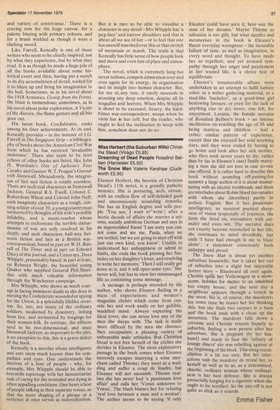Broad canvas
Francis King
£5.95) Confederates Thomas Keneally (Collins Although the greatest of all novels. War and Peace, is an historical one, in this century the genre has increasingly tended to be accommodated in an annexe to the mansion of fiction. Literary editors — unless the author is one of exceptional talent — leo,e historical novels for a periodic `round-uP rather as though they were strays to be corralled together and then brought to the literary equivalent of the Battersea Dogs Home. In the last few years, however, the genre seems to have been slowly regaining a lost respect. One of the best of postwar novelists, J.G. Farrell, won the Booker Prize with The Siege of Krishnapur, about the Indian Mutiny, and Thomas KeneallY has just, for the third time, appeared on th.e Booker short list for a work similarly set In the past. I sense that readers have begun to weary of the sort of writers that Evelyn, Waugh had in mind when, in The Ordeal 0.1 Gilbert Pin fold, he wrote that Tbe, originators, the exuberant men, arc eoxdteitsitcity_ and in their place subsists and flourishes a generation notable for elegance and variety of contrivance,' There is a craving now for the huge canvas, for a palette blazing with primary colours, and for a brush wielded as though it were a slashing sword, Like Farrell, Keneally is one of those writers who seem to be chiefly inspired, not by what they experience, but by what they read. It is as though he made a huge pile of all the books available about some historical event and then, having put a match to its dry accumulation of detail, waited for it to blaze up and bring his imagination to the boil. Sometimes, as in his novel about the 1918 Armistice, Gossip from the Forest, the blaze is tremendous; sometimes, as in his novel about polar exploration, A Victim of the Aurora, the flame gutters and all but goes out.
His latest book, Confederates, ranks among his finer achievements. At its end, Keneally provides — in the manner of J.G. Farrell in The Singapore Grip — a bibliography of books about the American Civil War from which he has received 'invaluable assistance'. There also seem to be faint echoes of other books not listed, like John H. Worsham's One of Jackson's Foot Cavalry and Gunner W.T. Poague's Gunner with Stonewall. Miraculously, the integration of fact and fiction is totally seamless. There are such real characters as Stonewall Jackson, General R.S. Ewell, Colonel C. Roberdeau Wheat and Colonel John Neff; such imaginary characters as a tough, cunning soldier °foyer 70, a young countryman tormented by thoughts of his wife's possible infidelity, and a music-teacher whose attempts to orchestrate the terrible disharmonies of war are only resolved in his death; and such characters half-way between fiction and fact as a British warcorrespondent, based in part on W.H. Russell of The Times and in part on Edward Dicey of this journal, and a Union spy, Dora Whipple, presumably based, in part at least, on Rebecca Wright, the beautiful young Quaker who supplied General Phil ,Sheridan with much valuable information through the Winchester campaign.
Mrs Whipple, who shows as much courage in facing imminent death as she does in nursing the Confederate wounded or spying tor the Union, is a splendidly lifelike creation. So, too, are many of the ordinary soldiers, weakened by dysentery, itching from lice, and tormented by longings for their women-folk. In contrast, the officers tend to be two-dimensional; and since Stonewall Jackson , so important to the plot, is no exception to this, this is a grave defect of the book.
Keneally is a novelist whose intelligence and ears seem much keener than his sympathies and eyes. One understands the motives of a host of people — why, for example, Mrs Whipple should be able to reconcile espionage with her humanitarian task of caring for the wounded and dying in often appalling conditions. One hears a host of people talking in their separate voices, so that the mere shaping of a phrase or a sentence at once serves as indentification. But it is rare to be able to visualise a character in any detail —Mrs Whipple has 'a pug-face' and narrow shoulders and that is about all we see of her — or to feel that one has oneself marched over this or that stretch of mountain or marsh, The truth is that Keneally has little sense of how people look and move and even less of place and atmosphere.
The novel, which is extremely long but never tedious, compels admiration over and over again for its energy, its organisation and its insight into human character. But, for me at, any rate, it rarely succeeds in arousing any deep emotion, despite all its tragedies and horrors. When Mrs Whipple is about to be executed, Searcy, the hardbitten war-correspondent, weeps when he visits her in her cell; but the reader, who ought to feel the inclination to weep with him, somehow does not do so.
Miss Herbert (the Suburban Wife) Christina Stead (Virago £5.95) Dreaming of Dead People Rosalind Belben (Harvester £5.50) The Snow Man Valerie Kershaw (Duckworth £5.95) Eleanor Herbert, the heroine of Christina Stead's 11th novel, is a grandly pathetic monster. She is posturing, arch, obtuse, with an endless flow of self-deluded gush and unconsciously wounding remarks. She has an English degree and tells people 'You see, I want to write'; after a hectic decade of affairs she marries a solemn, socially ambitious German and says to an impoverished friend 'I am sorry you cannot come and see me, Paula, when we are settled, but we are going to start off with just our own kind, you know'. Unable to understand her unhappiness or admit to faults, she ends the book pinning her fantasies on her daughter's lover, and resolving to write her memoirs: 'Then I will really get down to it; and it will open some eyes.' She never will, but has to view her mismanaged life as containing some message. A message is perhaps intended by the author, who shows Eleanor flailing in a mass of expectations and women's magazine clichés which come from outside her and work easily on her gullible, muddled mind. Always expecting the ideal lover, she can never love any of the men she sleeps with. The task is made more difficult by the men she chooses: they encapsulate a pleasing variety of unbearable male attitudes. But Christina Stead is not free herself of the clichés she derides in Eleanor. The most explanatory passage in the book comes when Eleanor narrowly escapes marrying a wine merchant called Thieme; they meet at a wedding and suffer a coup de foudre, but Eleanor will not succumb. Thieme realises she has never had 'a passionate love affair' and calls her 'Venus unknown to Venus'. The blurb blames her for refusing 'real love between a man and a woman'. The author seems to be saying 'if only Eleanor could have seen it, here was the man of her dreams.' Maybe Thieme as salvation is too glib, but what dazzles and mesmerises in the book is Eleanor's fluent everyday wrongness — the incurable failure of taste, as well as imagination, in every word and thought. To have made her so repellent, and yet aroused sympathy through her anger and puzzlement at her wasted life, is a clever feat of equilibrium.
Eleanor's innumerable affairs were undertaken in an attempt to fulfil fantasy roles: as a writer gathering material, as a stud-like 'bachelor', as a good-time girl bestowing favours; or even for the lack of anything else to do; never, one felt, for enjoyment. Lavinia, the female narrator of Rosalind Belben's book — an intense meditation on Teaching the age of 36 and being manless and childless — had a rather similar pattern of experience, except that she enjoyed her avid screwing days, and they were ended by having to go home and look after her sick mother, who then took seven years to die, rather than by (as in Eleanor's case) finally marrying a man she did not love in case no-one else offered. It is rather hard to describe this book without sounding off-putting;for instance a large section of it is about masturbating with an electric toothbrush, and there are interludes about Robin Hood (an outsider with whom she identifies) partly in archaic English. But it has passionate intelligence, an insistent poetical sharpness of vision (especially of journeys, the farm she lived on, encounters with animals) and even wit. The narrator does not exactly become reconciled to her life; she continues to mind dreadfully, but ends 'I have fuel enough in me to blaze alone', a statement consciously both unhappy and proud.
The Snow Man is about yet another suburban housewife, but it takes her out of suburbia into a slight but enjoyable horror story — Bluebeard all over again. Christie spills her Volkswagen in a snowstorm, hobbles for shelter to an inhabited but empty house, and the next day a neighbour appears through a trench in the snow. He is, of course, the murderer; for some time he teases her for thinking this, but she finds two corpses in a barn and the book ends with a chase up the mountain. The murderer falls down a crevasse and Christie returns happily to suburbia, feeling a new person after her adventure. She is pregnant (by her husband) and ready to face the 'infinity of lounge diners' she was rebelling against at the beginning of the book. This smug reconciliation is a bit too easy. But her interactions with the murderer do reveal her, to herself as well as to us, as a determined, chaotic, ordinary woman whose ordinariness is her best defence. She is always' prosacially longing for a cigarette when she ought to be terrified. So the pay-off is not quite as slick as it sounds.







































 Previous page
Previous page